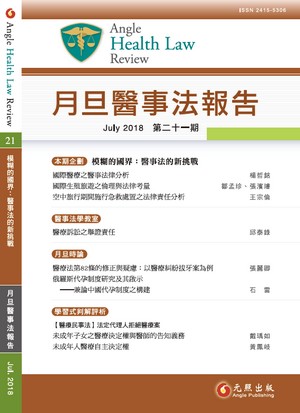空中旅行期間施行急救處置之法律責任分析【本期企劃】 試閱
Analysis of the Legal Responsibility of Taking Emergent Treatments during a Voyage
為免除一般民眾對於急救可能產生訴訟糾紛之疑慮,緊急醫療救護法第14條之2已明文適用民、刑法關於緊急避難免責之規定。然而,醫護人員若於搭乘航空器期間,為患者採取緊急醫療措施,是否仍得作相同主張,則尚待釐清。本文嘗試比較大陸法系與英美法系對此議題之立法異同,最後指出現行規定可能之疏漏。本文認為,救護人員為免除他人生命之急迫危險,使用緊急救護設備或施予急救措施,不應以是否處於值勤期間而有免責與否之差別,如以法無明文即認救護人員於值勤期間不得主張民法與刑法關於緊急避難免責之規定,將嚴重背離人民的法感情,並影響以濟世救人為志向之醫護人員的權利甚鉅。
In order to prevent from the anxiety that it might lead to lawsuits by taking an emergent medical treatment, the norms of the emergency avoidance in Civil Law and Criminal Law could be applied according to the paragraph 14b of the Emergency Medical Service Act. However, it would be need to clarify whether medical staff who took an emergent medical treatment to a patient during a voyage could have the same position. A comparison between the civil law system and the common law would be the issue in this article and shortcomings of current regulations would also be proposed. In the opinion of this article, there would be no more difference whether medical staff who taking emergent medical treatments to prevent others from any emergent dangerous to life, using equipment of emergent medical treatments, is on the duty. Otherwise, complaining about that medical staff who wasn’t in duty couldn’t apply the regulations for emergency avoidance in Civil Law and Criminal Law, it would deviate from the consciousness of legality of the mass and interfere huge the rights of medical staff with calling of saving life.
032-047






